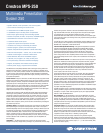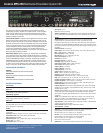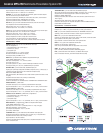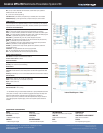
> System switcher, audio processor, and control system
> Out-of-the-box switching and audio control
> 2 video/HDTV and 3 RGB/computer inputs
> 1 QuickMedia input with delay skew compensation
> Built-in input signal sensing | auto-switching capable
> Discrete composite, S-Video, component, and RGB outputs
> QuickMedia and Crestron Home CAT5 AV outputs
> 5 balanced stereo audio inputs
> 2 gated mic inputs with compressor & limiter
> 4-channel mic mixing w/4-band EQ per channel
> Discrete program, speech, and record outputs
> Graphic and parametric equalization | 40mS audio delay
> Built-in 40 watt amplifier — stereo, 70V, or 100V models
> 2-Series control engine | e-Control 2 Web server
> 10/100 Ethernet | RoomView and SNMP support
> 2 RS-232, 4 IR, 4 digital in, & 4 relay control ports
> Front panel setup and control | Backlit LCD display
> Keypad, touchpanel, and wireless control options
> Internal power supply | 2-space rack-mountable
The MPS-250 is a complete presentation control and signal routing solution for
boardrooms and classrooms. Integrating the control system, multimedia matrix
switcher, mic mixer, audio processor, amplifier, and QuickMedia distribution center
all into a single 2-space rackmount package, the MPS-250 affords considerable
signal routing versatility and high-performance signal processing without the need
for separate components.
System Switcher—Right out of the box, the MPS-250 provides high-performance
switching of 2 video and 3 RGB computer sources to a single projector or plasma
display. Composite, S-Video, component and RGBHV signals can be routed to the
appropriate inputs on the display device, with control of the display provided via
Ethernet, RS-232 or IR. Input signal sensing is provided on every video and RGB
input to enable auto-switching functionality and provide device power status
information to the control system. Selectable sync impedance on the RGB inputs
helps accommodate cable runs of varying lengths.
Versatile matrix switching inside the MPS-250 actually affords some additional
hidden signal routing flexibility, providing discrete switchable outputs for RGB,
composite, S-Video, and component signals. For instance, Outputs 1 and 2 can
function as separate composite and S-Video outputs, or as a single component
output; Output 3 can be a single component, S-Video, or composite output; and
Output 4 can be used for either RGB or component. Each output is fed by a
separate matrix crosspoint, so they all can be active simultaneously and assigned
any relevant input source.
Touchpanel Output—An additional discrete output is provided on the MPS-250 to
feed a preview signal to the system touchpanel or other monitor. This output is
controlled separately from the main display outputs, allowing a different source to
be viewed on the touchpanel. The touchpanel connection is facilitated through a
choice of QuickMedia
®
(QM) or Crestron Home
®
(CH) CAT5 Balanced Video
outputs, simplifying wiring to a wide range of Crestron touchpanels. The QM
output supports high-resolution RGB and HDTV plus audio, while the CH output is
limited to standard video and HDTV only (dependent upon the capabilities of
the touchpanel).
QuickMedia
®
—The QM Touchpanel output can also be used to feed signals
straight to the primary display device, providing a very streamlined, low-cost, long-
distance wiring solution. Crestron’s exclusive QuickMedia transport transmits
high-resolution RGB, HD video, stereo program and microphone audio signals
up to 450 feet over a single inexpensive CAT5e type cable*. Just one
CresCAT-QM cable and a QM receiver are all that is required for complete signal
routing and device control, eliminating all the bulky, expensive cabling that would
otherwise be needed.
A single QM input is also provided on the MPS-250, providing additional inputs
for AV, computer, and microphone sources through the simple connection of a
QM Wall Plate, FlipTop Box, or Distribution Center.
4-Channel Microphone Matrix Mixing—Two gated microphone/line inputs are
included on the MPS-250 complete with software-switchable 48V phantom
power and independently adjustable compression and limiting. Two additional
microphone signals can be brought in through the QM input, with 4-band
speech-optimized equalization provided on all 4 mic channels. Sophisticated
matrix mixing allows for four completely different mixes of all 4 microphones—
three mixes feeding discrete “local” outputs, and one additional mix feeding the
QM output.
Professional Audio Features—Five stereo audio inputs on the rear panel accept
balanced or unbalanced line-level signals from computers and other program
audio sources. Additional audio sources can be brought in through the QM input.
To accommodate a wide range of signals, adjustable input compensation is
employed to help maintain consistent volume levels when switching between
sources. Versatile matrix mixing allows the selected program signal and the 4
microphone signals to be separated or mixed in any combination to feed 3
“local” outputs, each with its own unique mix.
Three discrete balanced line level outputs are provided, each with independent
adjustments for volume, bass, treble, and mute. The stereo PROGRAM and
mono SPEECH outputs are normally intended for driving external amplification,
with relay muting on each output to prevent “thumping” on power up. The
RECORD output allows for a separate stereo mix to feed a recording device or
assistive listening system. Ten-band graphic equalization plus 2-band parametric
equalization on each output eliminates the need for expensive outboard audio
processors, and up to 40mS delay adjustment is available on the SPEECH output
for proper loudspeaker alignment.
The QM Touchpanel output is controlled separately from the other audio outputs,
allowing a different program source and microphone mix to be monitored on the
touchpanel, or output to other audio equipment by way of an appropriate QM
receiver or other QuickMedia device.
Built-in Amplifier—A 40-watt amplifier is built into the MPS-250, with three
models available offering the choice of 8-ohm stereo, 70V mono, or 100V mono
outputs. For large rooms requiring more power, the MPS-250 supports plug-
and-play compatibility with Crestron's QM-Series 3-channel amplifiers, providing
a complete solution for driving a professional loudspeaker system with discrete
program and speech channels.
Front Panel Control—Out of the box, the MPS-250 front panel supports easy
pushbutton routing of input sources to each of the outputs, and audio volume
adjustment using the volume control knob. Dedicated buttons and indicators are
also provided for separate control of system power and projector power. In
addition, five preset buttons are included for custom functions such as lowering
a projection screen, closing blinds, or selecting a lighting preset.
The front panel label strips are easily customized using Crestron Engraver
software or standard 3/8” tape labels, allowing for the clear designation of each
input, output, and preset button. When selected, these functions will also appear
on the LCD display as generic names (Input 1, 2…), or as custom names (DVD,
Podium PC, Screen Up, etc.).
www.crestron.com
|
800.237.2041
Crestron MPS-250
Multimedia Presentation
System 250






